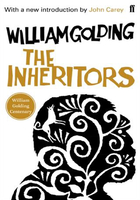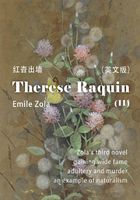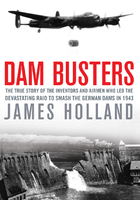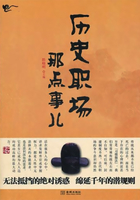THE TRAIN WENT ON UP THE TRACK OUT of sight, around one of the hills of burnt timber. Nick sat down on the bundle of canvas and bedding the baggage man had pitched out of the door of the baggage car. There was no town, nothing but the rails and the burned-over country. The thirteen saloons that had lined the one street of Seney had not left a trace. The foundations of the Mansion House hotel stuck up above the ground. The stone was chipped and split by the fire. It was all that was left of the town of Seney. Even the surface had been burned off the ground.
Nick looked at the burned-over stretch of hillside, where he had expected to find the scattered houses of the town and then walked down the railroad track to the bridge over the river. The river was there. It swirled against the log spiles of the bridge. Nick looked down into the clear, brown water, colored from the pebbly bottom, and watched the trout keeping themselves steady in the current with wavering fins. As he watched them they changed their positions by quick angles, only to hold steady in the fast water again. Nick watched them a long time.
He watched them holding themselves with their noses into the current, many trout in deep, fast moving water, slightly distorted as he watched far down through the glassy convex surface of the pool, its surface pushing and swelling smooth against the resistance of the log-driven piles of the bridge. At the bottom of the pool were the big trout. Nick did not see them at first. Then he saw them at the bottom of the pool, big trout looking to hold themselves on the gravel bottom in a varying mist of gravel and sand, raised in spurts by the current.
Nick looked down into the pool from the bridge. It was a hot day. A kingfisher flew up the stream. It was a long time since Nick had looked into a stream and seen trout. They were very satisfactory. As the shadow of the kingfisher moved up the stream, a big trout shot upstream in a long angle, only his shadow marking the angle, then lost his shadow as he came through the surface of the water, caught the sun, and then, as he went back into the stream under the surface, his shadow seemed to float down the stream with the current, unresisting, to his post under the bridge where he tightened facing up into the current.
Nick's heart tightened as the trout moved. He felt all the old feeling.
He turned and looked down the stream. It stretched away, pebbly-bottomed with shallows and big boulders and a deep pool as it curved away around the foot of a bluff.
Nick walked back up the ties to where his pack lay in the cinders beside the railway track. He was happy. He adjusted the pack harness around the bundle, pulling straps tight, slung the pack on his back, got his arms through the shoulder straps and took some of the pull off his shoulders by leaning his forehead against the wide band of the tump-line. Still, it was too heavy. It was much too heavy. He had his leather rod-case in his hand and leaning forward to keep the weight of the pack high on his shoulders he walked along the road that paralleled the railway track, leaving the burned town behind in the heat, and then turned off around a hill with a high, fire-scarred hill on either side onto a road that went back into the country. He walked along the road feeling the ache from the pull of the heavy pack. The road climbed steadily. It was hard work walking up-hill. His muscles ached and the day was hot, but Nick felt happy. He felt he had left everything behind, the need for thinking, the need to write, other needs. It was all back of him.
From the time he had gotten down off the train and the baggage man had thrown his pack out of the open car door things had been different. Seney was burned, the country was burned over and changed, but it did not matter. It could not all be burned. He knew that. He hiked along the road, sweating in the sun, climbing to cross the range of hills that separated the railway from the pine plains.
The road ran on, dipping occasionally, but always climbing. Nick went on up. Finally the road after going parallel to the burnt hillside reached the top. Nick leaned back against a stump and slipped out of the pack harness. Ahead of him, as far as he could see, was the pine plain. The burned country stopped off at the left with the range of hills. On ahead islands of dark pine trees rose out of the plain. Far off to the left was the line of the river. Nick followed it with his eye and caught glints of the water in the sun.
There was nothing but the pine plain ahead of him, until the far blue hills that marked the Lake Superior height of land. He could hardly see them, faint and far away in the heat-light over the plain. If he looked too steadily they were gone. But if he only half-looked they were there, the far-off hills of the height of land.
Nick sat down against the charred stump and smoked a cigarette. His pack balanced on the top of the stump, harness holding ready, a hollow molded in it from his back. Nick sat smoking, looking out over the country. He did not need to get his map out. He knew where he was from the position of the river.
As he smoked, his legs stretched out in front of him, he noticed a grasshopper walk along the ground and up onto his woolen sock. The grasshopper was black. As he had walked along the road, climbing, he had started many grasshoppers from the dust. They were all black. They were not the big grasshoppers with yellow and black or red and black wings whirring out from their black wing sheathing as they fly up. These were just ordinary hoppers, but all a sooty black in color. Nick had wondered about them as he walked, without really thinking about them. Now, as he watched the black hopper that was nibbling at the wool of his sock with its fourway lip, he realized that they had all turned black from living in the burned-over land. He realized that the fire must have come the year before, but the grasshoppers were all black now. He wondered how long they would stay that way.
Carefully he reached his hand down and took hold of the hopper by the wings. He turned him up, all his legs walking in the air, and looked at his jointed belly. Yes, it was black too, iridescent where the back and head were dusty.
"Go on, hopper," Nick said, speaking out loud for the first time. "Fly away somewhere."
He tossed the grasshopper up into the air and watched him sail away to a charcoal stump across the road.
Nick stood up. He leaned his back against the weight of his pack where it rested upright on the stump and got his arms through the shoulder straps. He stood with the pack on his back on the brow of the hill looking out across the country toward the distant river and then struck down the hillside away from the road. Underfoot the ground was good walking. Two hundred yards down the hillside the fire line stopped. Then it was sweet fern, growing ankle high, to walk through, and clumps of jack pines; a long undulating country with frequent rises and descents, sandy underfoot and the country alive again.
Nick kept his direction by the sun. He knew where he wanted to strike the river and he kept on through the pine plain, mounting small rises to see other rises ahead of him and sometimes from the top of a rise a great solid island of pines off to his right or his left. He broke off some sprigs of the heathery sweet fern, and put them under his pack straps. The chafing crushed it and he smelled it as he walked.
He was tired and very hot, walking across the uneven, shadeless pine plain. At any time he knew he could strike the river by turning off to his left. It could not be more than a mile away. But he kept on toward the north to hit the river as far upstream as he could go in one day's walking.
For some time as he walked Nick had been in sight of one of the big islands of pine standing out above the rolling high ground he was crossing. He dipped down and then as he came slowly up to the crest of the bridge he turned and made toward the pine trees.
There was no underbrush in the island of pine trees. The trunks of the trees went straight up or slanted toward each other. The trunks were straight and brown without branches. The branches were high above. Some interlocked to make a solid shadow on the brown forest floor. Around the grove of trees was a bare space. It was brown and soft underfoot as Nick walked on it. This was the over-lapping of the pine needle floor, extending out beyond the width of the high branches. The trees had grown tall and the branches moved high, leaving in the sun this bare space they had once covered with shadow. Sharp at the edge of this extension of the forest floor commenced the sweet fern.
Nick slipped off his pack and lay down in the shade. He lay on his back and looked up into the pine trees. His neck and back and the small of his back rested as he stretched. The earth felt good against his back. He looked up at the sky, through the branches, and then shut his eyes. He opened them and looked up again. There was a wind high up in the branches. He shut his eyes again and went to sleep.
Nick woke stiff and cramped. The sun was nearly down. His pack was heavy and the straps painful as he lifted it on. He leaned over with the pack on and picked up the leather rod-case and started out from the pine trees across the sweet fern swale, toward the river. He knew it could not be more than a mile.
He came down a hillside covered with stumps into a meadow. At the edge of the meadow flowed the river. Nick was glad to get to the river. He walked upstream through the meadow. His trousers were soaked with the dew as he walked. After the hot day, the dew had come quickly and heavily. The river made no sound. It was too fast and smooth. At the edge of the meadow, before he mounted to a piece of high ground to make camp, Nick looked down the river at the trout rising. They were rising to insects come from the swamp on the other side of the stream when the sun went down. The trout jumped out of water to take them. While Nick walked through the little stretch of meadow alongside the stream, trout had jumped high out of water. Now as he looked down the river, the insects must be settling on the surface, for the trout were feeding steadily all down the stream. As far down the long stretch as he could see, the trout were rising, making circles all down the surface of the water, as though it were starting to rain.
The ground rose, wooded and sandy, to overlook the meadow, the stretch of river and the swamp. Nick dropped his pack and rod-case and looked for a level piece of ground. He was very hungry and he wanted to make his camp before he cooked. Between two jack pines, the ground was quite level. He took the ax out of the pack and chopped out two projecting roots. That leveled a piece of ground large enough to sleep on. He smoothed out the sandy soil with his hand and pulled all the sweet fern bushes by their roots. His hands smelled good from the sweet fern. He smoothed the uprooted earth. He did not want anything making lumps under the blankets. When he had the ground smooth, he spread his three blankets. One he folded double, next to the ground. The other two he spread on top.
With the ax he slit off a bright slab of pine from one of the stumps and split it into pegs for the tent. He wanted them long and solid to hold in the ground. With the tent unpacked and spread on the ground, the pack, leaning against a jackpine, looked much smaller. Nick tied the rope that served the tent for a ridge-pole to the trunk of one of the pine trees and pulled the tent up off the ground with the other end of the rope and tied it to the other pine. The tent hung on the rope like a canvas blanket on a clothesline. Nick poked a pole he had cut up under the back peak of the canvas and then made it a tent by pegging out the sides. He pegged the sides out taut and drove the pegs deep, hitting them down into the ground with the flat of the ax until the rope loops were buried and the canvas was drum tight.
Across the open mouth of the tent Nick fixed cheesecloth to keep out mosquitoes. He crawled inside under the mosquito bar with various things from the pack to put at the head of the bed under the slant of the canvas. Inside the tent the light came through the brown canvas. It smelled pleasantly of canvas. Already there was something mysterious and homelike. Nick was happy as he crawled inside the tent. He had not been unhappy all day. This was different though. Now things were done. There had been this to do. Now it was done. It had been a hard trip. He was very tired. That was done. He had made his camp. He was settled. Nothing could touch him. It was a good place to camp. He was there, in the good place. He was in his home where he had made it. Now he was hungry.
He came out, crawling under the cheesecloth. It was quite dark outside. It was lighter in the tent.
Nick went over to the pack and found, with his fingers, a long nail in a paper sack of nails, in the bottom of the pack. He drove it into the pine tree, holding it close and hitting it gently with the flat of the ax. He hung the pack up on the nail. All his supplies were in the pack. They were off the ground and sheltered now.
Nick was hungry. He did not believe he had ever been hungrier. He opened and emptied a can of pork and beans and a can of spaghetti into the frying pan. "I've got a right to eat this kind of stuff, if I'm willing to carry it," Nick said. His voice sounded strange in the darkening woods. He did not speak again.
He started a fire with some chunks of pine he got with the ax from a stump. Over the fire he stuck a wire grill, pushing the four legs down into the ground with his boot. Nick put the frying pan on the grill over the flames. He was hungrier. The beans and spaghetti warmed. Nick stirred them and mixed them together. They began to bubble, making little bubbles that rose with difficulty to the surface. There was a good smell. Nick got out a bottle of tomato catchup and cut four slices of bread. The little bubbles were coming faster now. Nick sat down beside the fire and lifted the frying pan off. He poured about half the contents out into the tin plate. It spread slowly on the plate. Nick knew it was too hot. He poured on some tomato catchup. He knew the beans and spaghetti were still too hot. He looked at the fire, then at the tent, he was not going to spoil it all by burning his tongue. For years he had never enjoyed fried bananas because he had never been able to wait for them to cool. His tongue was very sensitive. He was very hungry. Across the river in the swamp, in the almost dark, he saw a mist rising. He looked at the tent once more. All right. He took a full spoonful from the plate.
"Chrise," Nick said, "Geezus Chrise," he said happily.
He ate the whole plateful before he remembered the bread. Nick finished the second plateful with the bread, mopping the plate shiny. He had not eaten since a cup of coffee and a ham sandwich in the station restaurant at St. Ignace. It had been a very fine experience. He had been that hungry before, but had not been able to satisfy it. He could have made camp hours before if he had wanted to. There were plenty of good places to camp on the river. But this was good.
Nick tucked two big chips of pine under the grill. The fire flared up. He had forgotten to get water for the coffee. Out of the pack he got a folding canvas bucket and walked down the hill, across the edge of the meadow, to the stream. The other bank was in the white mist. The grass was wet and cold as he knelt on the bank and dipped the canvas bucket into the stream. It bellied and pulled hard in the current. The water was ice cold. Nick rinsed the bucket and carried it full up to the camp. Up away from the stream it was not so cold.
Nick drove another big nail and hung up the bucket full of water. He dipped the coffee pot half full, put some more chips under the grill onto the fire and put the pot on. He could not remember which way he made coffee. He could remember an argument about it with Hopkins, but not which side he had taken. He decided to bring it to a boil. He remembered now that was Hopkins's way. He had once argued about everything with Hopkins. While he waited for the coffee to boil, he opened a small can of apricots. He liked to open cans. He emptied the can of apricots out into a tin cup. While he watched the coffee on the fire, he drank the juice syrup of the apricots, carefully at first to keep from spilling, then meditatively, sucking the apricots down. They were better than fresh apricots.
The coffee boiled as he watched. The lid came up and coffee and grounds ran down the side of the pot. Nick took it off the grill. It was a triumph for Hopkins. He put sugar in the empty apricot cup and poured some of the coffee out to cool. It was too hot to pour and he used his hat to hold the handle of the coffee pot. He would not let it steep in the pot at all. Not the first cup. It should be straight Hopkins all the way. Hop deserved that. He was a very serious coffee drinker. He was the most serious man Nick had ever known. Not heavy, serious. That was a long time ago. Hopkins spoke without moving his lips. He had played polo. He made millions of dollars in Texas. He had borrowed carfare to go to Chicago, when the wire came that his first big well had come in. He could have wired for money. That would have been too slow. They called Hop's girl the Blonde Venus. Hop did not mind because she was not his real girl. Hopkins said very confidently that none of them would make fun of his real girl. He was right. Hopkins went away when the telegram came. That was on the Black River. It took eight days for the telegram to reach him. Hopkins gave away his .22 caliber Colt automatic pistol to Nick. He gave his camera to Bill. It was to remember him always by. They were all going fishing again next summer. The Hop Head was rich. He would get a yacht and they would all cruise along the north shore of Lake Superior. He was excited but serious. They said good-bye and all felt bad. It broke up the trip. They never saw Hopkins again. That was a long time ago on the Black River.
Nick drank the coffee, the coffee according to Hopkins. The coffee was bitter. Nick laughed. It made a good ending to the story. His mind was starting to work. He knew he could choke it because he was tired enough. He spilled the coffee out of the pot and shook the grounds loose into the fire. He lit a cigarette and went inside the tent. He took off his shoes and trousers, sitting on the blankets, rolled the shoes up inside the trousers for a pillow and got in between the blankets.
Out through the front of the tent he watched the glow of the fire, when the night wind blew on it. It was a quiet night. The swamp was perfectly quiet. Nick stretched under the blanket comfortably. A mosquito hummed close to his ear. Nick sat up and lit a match. The mosquito was on the canvas, over his head. Nick moved the match quickly up to it. The mosquito made a satisfactory hiss in the flame. The match went out. Nick lay down again under the blanket. He turned on his side and shut his eyes. He was sleepy. He felt sleep coming. He curled up under the blanket and went to sleep.
CHAPTER XV
They hanged Sam Cardinella at six o'clock in the morning in the corridor of the county jail. The corridor was high and narrow with tiers of cells on either side. All the cells were occupied. The men had been brought in for the hanging. Five men sentenced to be hanged were in the five top cells. Three of the men to be hanged were negroes. They were very frightened. One of the white men sat on his cot with his head in his hands. The other lay flat on his cot with a blanket wrapped around his head.
They came out onto the gallows through a door in the wall. There were seven of them including two priests. They were carrying Sam Cardinella. He had been like that since about four o'clock in the morning.
While they were strapping his legs together two guards held him up and the two priests were whispering to him. "Be a man, my son," said one priest. When they came toward him with the cap to go over his head Sam Cardinella lost control of his sphincter muscle. The guards who had been holding him up both dropped him. They were both disgusted. "How about a chair, Will?" asked one of the guards. "Better get one," said a man in a derby hat.
When they all stepped back on the scaffolding back of the drop, which was very heavy, built of oak and steel and swung on ball bearings, Sam Cardinella was left sitting there strapped tight, the younger of the two priests kneeling beside the chair. The priest skipped back onto the scaffolding just before the drop fell.















